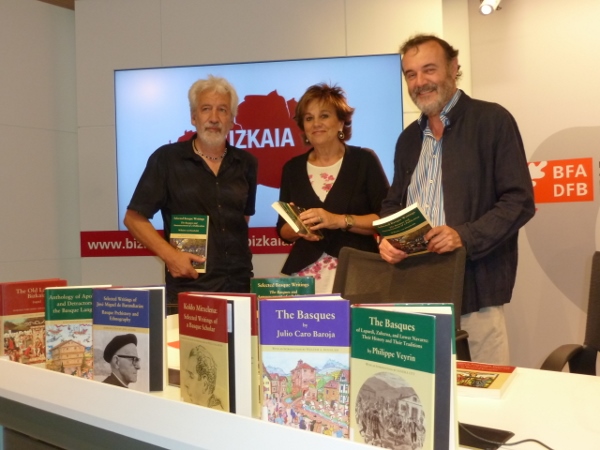basque heritage worldwide

07/25/2014

ADVERTISING
Bilbao, Bizkaia. Humboldt: Selected Basque Writings is the latest title in the Classics in Translation Series at the Center for Basque Studies, published in English in collaboration with the Provincial Government of Bizkaia in hopes of disseminating relevant titles in relation to the Basque language and culture internationally. The author chosen on this occasion was a reference of Basque Studies in his time, as explained in the presentation by representatives of the institutors involved in the volume.
Guillermo Humboldt (1967-1835), older brother of Alexander Humboldt [Humboldt county in Nevada, Elko county seat, was named after him], was the founder of the University of Berlin (and it curtrently holds his name). An intellectual of great fame, he spoke several languages, and had a great social influence. Once he finished his law degree, he specialized in philosophy, art, history and ancient languages. He also had a great fondness for the classics and was also a judge but quickly abandoned that profession.
He lived in Paris and came to the Basque Country between 1799 and 1801, before beginning to do diplomatic work. His later years were spent in Rome. When he returned to Berlin, as Minister of Education of Prussia, he completely reformed the education system and created the university: customizing plans of study, reinforcing programs to strengthen relationships between the professors and students, etc. He has been blamed at times for his elitist view of education. Whatever the case, he was one of the most prominent representatives of the “neohumanist” movement in Germany.
Thanks to his trips from Paris to the Basque Country, he was very familiar with Basque and developed different works. Some of these are being published for the first time in this work translated from the original work written in German. The person in charge of the translations and of the editing was Iñaki Zabalketa Gorrotxategi Professor at the University of the Basque Country. There are two works: The Basques and notes taken in the spring of 1801 on trips from Bizkaia to the French Basque Country, and An announcement of the publication of the Basque language and nation in 1812.
Humboldt studied the Basque Country as a nation, took ethnographic notes, and also researched Euskera. He said “it is a unique language, its lexicon as well as its morphology and pronunciation. It is unintelligible for outsiders, and this also happens with shorter words and place names, since the vast majorities are taken form the Basque language. This peculiarity also appears, to some extent, in the ancient lexical roots, and for outsiders they appear quite peculiar and strange.” Humboldt saw the Basque language as a natural property of an ethnic group: “The main feature of a peculiar people.”
In his opinion, the language defined the personality of a people and in Euskal Herria, he saw a type of union around Euskera beyond the political borders of France and Spain.
Basque Classics Series
This volume apperars in a collection of books published by the Center for Basque Studies at the University of Nevada in Reno. The fundamental goal of the collection is to publish Basque cultural classics in English. Series editors are Bill Douglass, Gregorio Monreal and Pello Salaburu.
To date nine books have been published in this series in English:
These publications are sent to the 600 most important libraries in the world.
The Provincial Government of Bizkaia has signed four agreements with the Association of Friends of Reno in 2003, 2008, 2012, and 2014. As part of the current agreement, two books will be edited on Antonio Tovar and Jacques Allieres. Each publication includes an extensive prologue, especially written for English readers, by an expert in the subject matter.
ADVERTISING
ADVERTISING
ADVERTISING
ADVERTISING
ADVERTISING
© 2014 - 2019 Basque Heritage Elkartea
Bera Bera 73
20009 Donostia / San Sebastián
Tel: (+34) 943 316170
Email: info@euskalkultura.eus